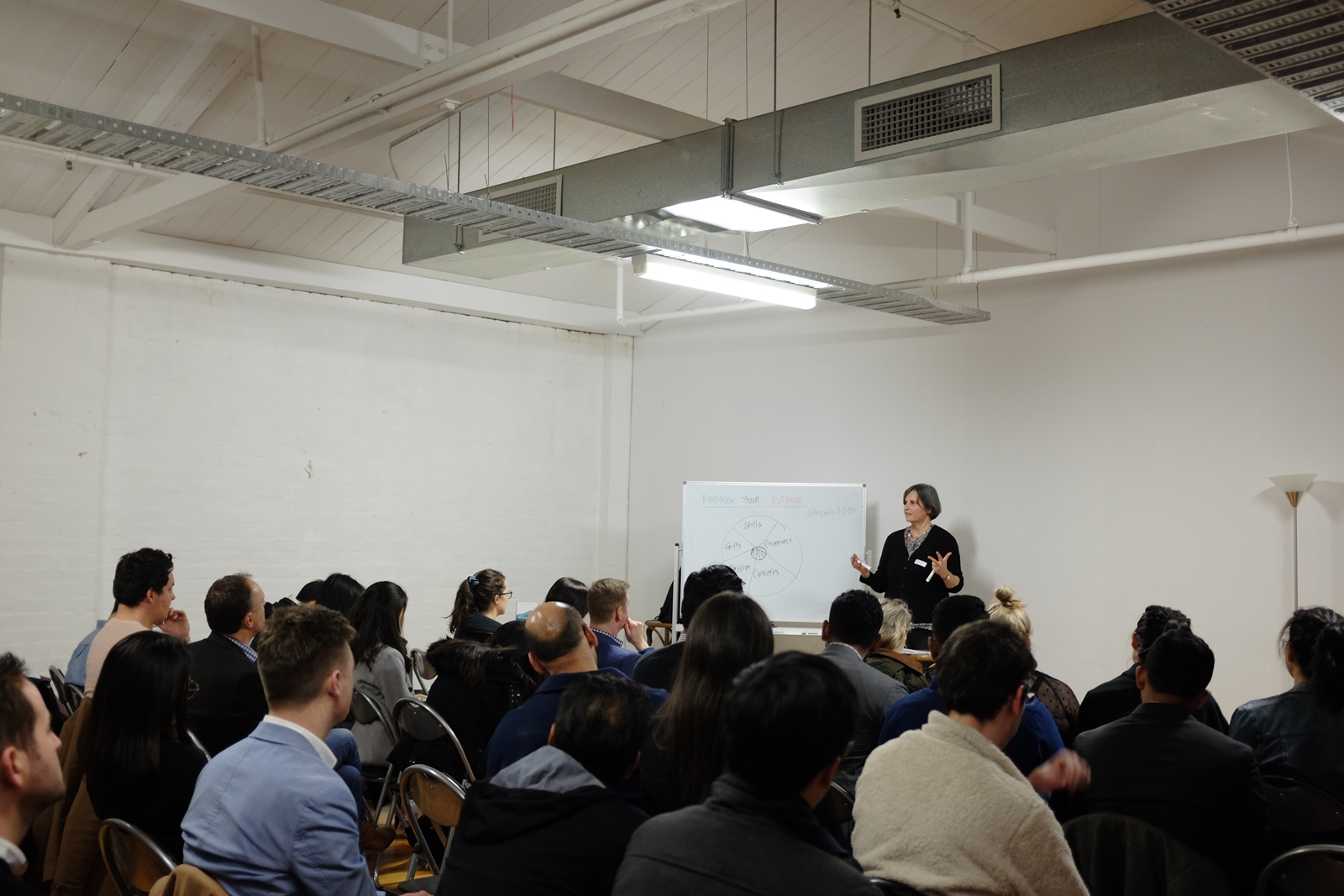By guest blogger: Alan Stanley
When my eldest two boys were young, they were given life-sized dolls of Bert and Ernie—from the television program Sesame Street—for Christmas. When opening their presents, what captivated them was not Bert and Ernie, but two small bags of balloons. Hmmm, what to get excited about, Bert and Ernie, or balloons? I would have thought Bert and Ernie, but not to them.
That is often how it is in life. I am currently unemployed. What excites me these days is a job opportunity, a “position,” an area where I can contribute. In fact, right now I was scheduled to leave for a month-long teaching trip overseas. That’s a month of feeling like I have something to offer, feeling useful. However, Coronavirus has put a stop to that. So now what?
We desire to contribute, to make a difference; we want to feel valued, we want to be active.
But what excites us is not always what excites God. Don’t get me wrong, God is interested in our work and our activities, but not always in the way we are. To him they can be like bags of balloons, while the true gift is standing right in front of us. Let me illustrate from a recent conversation.
I was talking to my wife about the Christian concept of “calling.” A call, to put it loosely, is when God places something on your heart so strongly that it becomes your mission or goal. I was telling my wife what I thought my “calling” was in this season of unemployment. An hour later I was reading 1 Corinthians 1 as part of my daily Bible reading plan. In verse 2 it says:
To the church of God in Corinth, to those sanctified in Christ Jesus and called to be his holy people, together with all those everywhere who call on the name of our Lord Jesus Christ—their Lord and ours.
The words “called to be his holy people” stood out like a neon light.
Given that I had only just spouted off on what I thought my calling was, it was pretty clear what was happening here as 1 Corinthians 1:2 stared back at me. It is as though God was saying, “Alan, this is your calling, to be holy; and what an ideal situation for you to learn that—no job, no income, no overseas travel. Perfect!” Not my idea of perfection!
I knew of course that I was called to be holy, every Christian knows that . . . however for this to be highlighted for me after claiming to know my calling, well, this had to be more than a coincidence. God was taking my attention off the metaphorical bag of balloons and focusing it on the metaphorical Bert and Ernie. This didn’t mean relaxing my search for a job, only that God was highlighting where my focus was to be—and indeed where his focus was. It’s hard though, I admit. Being called to be holy is not always number one on my priority list.
And yet this is something that God had been impressing upon me for years, through what I had discovered in the Scriptures. Let’s start at the beginning, when God created human beings:
Then God said, “Let us make mankind in our image, in our likeness, so that they may rule over the fish in the sea and the birds in the sky, over the livestock and all the wild animals, and over all the creatures that move along the ground.” (Genesis 1:26)
Image is about how we want to be known, how we want to be identified.
We may want to be identified as slim, sporty, tough, funny, well mannered, hard-working, intelligent,
easy going, tolerant, wealthy, educated, moral, religious, and so on.
But Genesis 1 tells us that God created us so that we might be identified with him! God created us so that others might see something of his glory (see especially Psalm 8:5), something of his character, something of God. It’s a simple plan!
In fact, we can see that this is his plan by following, very briefly, the storyline of the Bible. Following God’s creation sin enters the world and interrupts God’s plan. But notice the effects: with sin came a preoccupation with self. First, Eve is motivated by what she perceives to be good for her. Second, Eve and her husband become self-conscious and fear drives them into hiding. Third, neither are willing to bear responsibility for their actions and so they blame someone else (Genesis 3:6–13). If you are a parent, you may have noticed the sequence of these events in your kids. But it’s not just children. Selfishness now characterises the “whole world.” Take a look at where humanity end up:
Now the whole world had one language and a common speech. As people moved eastward, they found a plain in Shinar and settled there. . . . Then they said, “Come, let us build ourselves a city, with a tower that reaches to the heavens, so that we may make a name for ourselves . . .” (Genesis 11:1–2, 4)
The motivation behind humanity’s building project is their image: “that we may make a name for ourselves.”
So, the first section of the Bible begins with God’s overwhelming passion for his image and ends with humanity’s overwhelming passion for their image.
It begins with God’s intent to make a name for himself and ends with humanity’s intent to make a name for themselves.
God created human beings so that we might be identified with him, but we now want to be identified with our accomplishments. These accomplishments might be the accumulation of wealth, a successful business, a healthy body, a great marriage, godly children, a big house, a stellar reputation, intelligence, and so on. It’s the way we are wired; it’s in our DNA (from Genesis 3) we might say. And it was there that day when I was thinking about my calling—until God called me back to his original intention.
Look at how the next major section in Genesis starts. God promises to make Abram’s “name great” (Genesis 12:2). This promise shows us just how important the theme of image/name/identity is. In the previous chapter “the whole world” sought to “make a name” for themselves and now God responds, “I will make your name great.” The same promise next occurs when God promises David, “I will make for you a great name” (2 Samuel 7:9). The link between Abraham and David points ahead to “Jesus the Messiah the son of David, the son of Abraham” (Matthew 1:1) who will baptise people into his “name” (Matthew 28:19), indicating that Jesus gives us a new identity not based on our accomplishments. Hence, from Genesis 12 onwards it is clear that if our “name is ever to become great it will not be because of any self-initiated effort. The great name will be a gift, not an achievement.”[1]
Here is the point. God’s heart, his consuming passion, his longing or overwhelming ambition
—we might say his highest goal or purpose—is his image.
We can tell this from thinking about the non-human aspect of creation. Creation is intended to reflect God in some way (see Psalm 19:1–6). “For since the creation of the world God’s invisible qualities—his eternal power and divine nature—have been clearly seen, being understood from what has been made” (Romans 1:19–20). Couple these passages with God’s intent to create human beings in his image and likeness, and we get a clear picture of God’s heart. He has designed every square inch of his creation—non-human and human—so that wherever we look we might get a glimpse of what God is like. So that eventually “the earth will be filled with the knowledge of the glory of the LORD as the waters cover the sea” (Habakkuk 2:14).
A few years ago, I was a passenger in a car in Colombo, Sri Lanka. Suddenly the driver proudly asked me to look up at a giant billboard with a pretty young girl jumping in the air. It was his daughter. God created us so that we, his children, might be his billboard for all to see. This is what his promise to Abram was all about; Abram and his descendants were to be “a display people, a showcase to the world;”[2] or as another writer has said, God’s “poster child.”[3]
God is so serious about imaging himself that he became a billboard himself.
“No one has ever seen God, but the one and only Son, who is himself God and is in closest relationship with the Father, has made him known” (John 1:18). Thus, Jesus could say, “Anyone who has seen me has seen the Father” (John 14:9). Therefore, in Jesus we see “the image of the invisible God” (Colossians 1:15). Since no other individual or nation had been able to image God perfectly, God did it himself; and he went to extreme lengths to do it. John’s Gospel tells us that Jesus ultimately revealed the Father on the cross (see John 7:39; 12:16; 13:31; 17:1). The cross is the pinnacle of what God has been seeking to do from creation, to glorify his “name” (John 12:28). In going to the cross Jesus revealed the true image of God and brought God “glory” (John 17:4).
How does the cross glorify God? In short, “by conveying the divine love.”[4] At the cross “We are seeing, in particular, what God’s own love looks like.”[5] We all know John 3:16, “God so loved the world that he gave his one and only Son.”
However, it is better to translate the verse,
“For God loved the world in this way: He gave His One and Only Son” (Holman Christian Standard Bible).
The point is that God has gone to extreme lengths to reveal who he is to the world; to show the world that “God is love” (1 John 4:8, 16).
Now let’s return to the call to be holy! In being called to be holy, we are simply being called to image God: “Be holy, because I am holy” (1 Peter 1:16). Notice how the apostle Paul explains what it looks like “to put on the new self, which is being renewed . . . in the image of its Creator” (Colossians 3:10). Now, “as God’s chosen people, holy and dearly loved, clothe yourselves with compassion, kindness, humility, gentleness and patience.” He concludes, “And over all these virtues put on love, which binds them all together in perfect unity” (Colossians 3:12–14). Notice the other centred emphasis, summed up in love.
This explains why Jesus told his disciples, “By this everyone will know that you are my disciples, if you love one another” (John 13:35).
Jesus did not say “By your accomplishments or church attendance
everyone will know that you are my disciples.”
He said love!
By our love everyone will be able to tell that we belong to Jesus. Just as you can tell where people are from by their accent or skin colour, so too you can tell those who belong to Jesus by their love for one another. Love is the defining characteristic of God’s family (Matthew 22:36–37; Romans 13:8–10; Colossians 3:14; James 2:8). But not just any kind of love, this kind of love:
This is how we know what love is: Jesus Christ laid down his life for us. And we ought to lay down our lives for our brothers and sisters. If anyone has material possessions and sees a brother or sister in need but has no pity on them, how can the love of God be in that person? Dear children, let us not love with words or speech but with actions and in truth. (1 John 3:16–18)
Paul puts it like this: “Be imitators of God, therefore, as dearly loved children and live a life of love, just as Christ loved us and gave himself up for us as a fragrant offering and sacrifice to God” (Ephesians 5:1–2, NIV84). When our lives resemble Jesus on the cross, we are imitating God.
So, you see imaging God has always been God’s intention. And for Christians, we “have been called according to his purpose,” namely, “to be conformed to the image of his Son” (Romans 8:28–29). This is our calling. But here’s my problem, and I suspect I might not be alone:
My greatest desire, my passion—above all passions—is not always to be holy/to be conformed to the image of Jesus. My passion is to contribute, to make a difference, to feel useful, to feel like I have an identity related to my accomplishments.
I came across the following news article a number of years ago that well illustrates what we sometimes struggle with:
ANDREW Griffiths worked seven days a week, starting each day at 6am and not finishing until 9pm. He put on 50 kilos and his marriage of 10 years broke apart.
His job ruled his life.
“I’d always been a workaholic,” Mr Griffiths, owner of the Oceanic Marketing Group said.
“I based a lot of my self-worth on my success or failure in business.
“That translated to me working harder and harder to prove to the world I was successful. Everything else in my life became secondary.”[6]
“I based a lot of my self-worth on my success or failure in business.” Now, it might not be business that we find our self-worth in, it could be our qualifications, our speaking ability, our wisdom, our creativity, our possessions, our reputation, and so on. But God always calls us back to something greater, not greater according to our egos, but greater according to his Spirit (see Galatians 5:22).
To be focused on imaging Jesus means to be focused on people, and how best we might serve them. This was Jesus’ focus (e.g., Matthew 9:11; 11:19; Mark 10:45; Luke 15:1–2).
Here is how I am trying to work this out in my own life. It is always tempting to look into the future. But God is more interested that we focus on who we should be today (Matthew 6:33–34). The future is not unimportant of course, but so often our future obsessed thoughts are merely bags of balloons.
So, I ask myself, “What is in front of me right now?” It might be my wife, one of my kids, someone I am talking to after church, a friend I am meeting at a café, a sermon I am preparing, dishes to wash, a meeting to attend, dinner with family or friends, an article to write. In each one of these situations God is calling me to image Jesus. We struggle, I know, because our minds are often running ahead to our real passion—the business, work, the appointment later on, our spare time, the sermon to prepare. We are so prone to getting caught up with our own perceptions of greatness (Matthew 18:1–4). But whatever is right in front of us now is where God’s heart is. If it is a conversation, to listen well; to give the person our undivided attention, to be Christ to that person. Have you ever been talking to someone, but your heart and mind is somewhere else? We need to understand that God’s heart is not somewhere else. It’s right in front of us.
If it is a task or activity, to be conscious of who the task is for and perform it with an attitude that basically says, “I am helping someone by doing this.”
Currently as I write I need to be thinking, “How can I best serve those who read this?”
rather than, “How can I write in a way in which impresses those who read this?”
For those who are accountants, think about your clients and how you can best serve them. If you are mechanic, think about the person who owns the car you are working on and how you can best help them. Whatever job it is, be people focused. This is what it means to serve. Even when we pray, we are to do so as though we were in the shoes of those we pray for, “as if you were together with them . . . as if you yourselves were suffering” (Hebrews 13:3). To image Jesus in every situation is to love the people in front of us, to show them mercy, to act justly toward them (Matthew 23:23); to love them as we love ourselves (Matthew 22:36); to carry their burdens (Galatians 6:2); to be concerned for them as a whole person, their physical, emotional, and spiritual needs. Jesus modelled this better than anyone (Matthew 4:23–24; 9:35) and the early church followed his lead (Acts 2:42–47; Romans 12:9–21).
Whenever I lose my focus and caught up with those bags of balloons, there is a beautiful song that serves to remind me of my calling. I imagine it won’t be popular—not with our egos anyway. It’s by Josh Wilson and is called Dream Small:
It’s a momma singing songs about the Lord
It’s a daddy spending family time
That the world said he cannot afford
These simple moments change the world
It’s a pastor at a tiny little Church
Forty years of loving on the broken and the hurt
These simple moments change the world
It’s visiting the widow down the street
Or dancing on a Friday with your friend with special needs
These simple moments change the world
Of course, there’s nothing wrong with bigger dreams
Just don’t miss the minutes on your way, your bigger things, no
‘Cause these simple moments change the world
Out of these small things and watch them grow bigger
The God who does all things makes oceans from river
[And here’s the chorus:]
Dream small
Don’t bother like you've gotta do it all
Just let Jesus use you where you are
One day at a time
Live well
Loving God and others as yourselfFind little ways where only you can help
With His great love
A tiny rock can make a giant fall
Dream small[7]




















